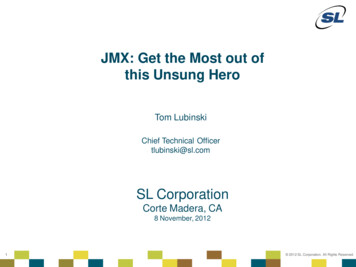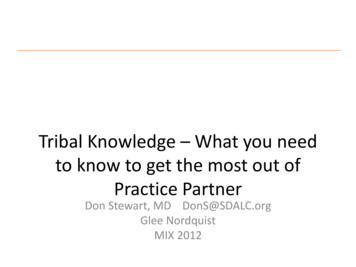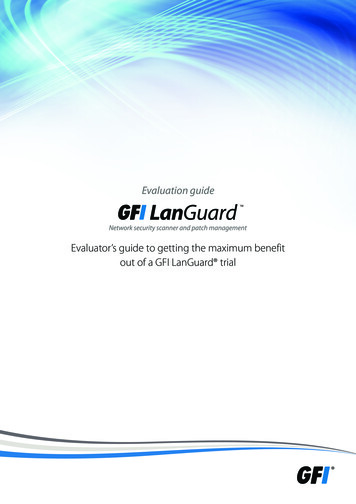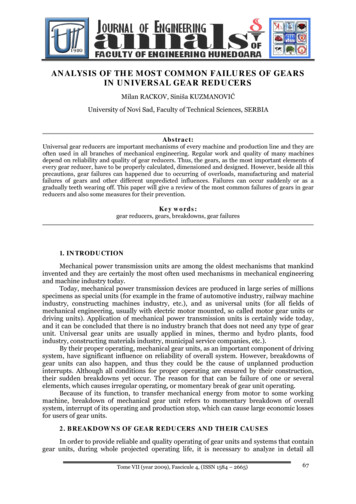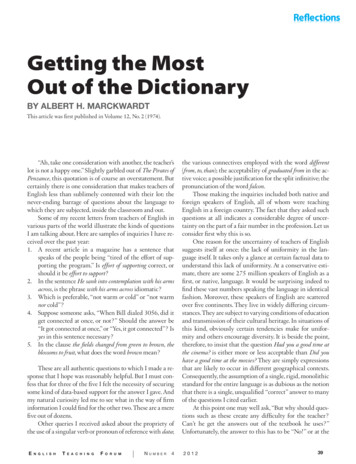
Transcription
Getting the MostOut of the DictionaryBY ALBERT H. MARCKWARDTThis article was first published in Volume 12, No. 2 (1974).“Ah, take one consideration with another, the teacher’slot is not a happy one.” Slightly garbled out of The Pirates ofPenzance, this quotation is of course an overstatement. Butcertainly there is one consideration that makes teachers ofEnglish less than sublimely contented with their lot: thenever-ending barrage of questions about the language towhich they are subjected, inside the classroom and out.Some of my recent letters from teachers of English invarious parts of the world illustrate the kinds of questionsI am talking about. Here are samples of inquiries I have received over the past year:1. A recent article in a magazine has a sentence thatspeaks of the people being “tired of the effort of supporting the program.” Is effort of supporting correct, orshould it be effort to support?2. In the sentence He sank into contemplation with his armsacross, is the phrase with his arms across idiomatic?3. Which is preferable, “not warm or cold” or “not warmnor cold”?4. Suppose someone asks, “When Bill dialed 3056, did itget connected at once, or not?” Should the answer be“It got connected at once,” or “Yes, it got connected”? Isyes in this sentence necessary?5. In the clause the fields changed from green to brown, theblossoms to fruit, what does the word brown mean?These are all authentic questions to which I made a response that I hope was reasonably helpful. But I must confess that for three of the five I felt the necessity of securingsome kind of data-based support for the answer I gave. Andmy natural curiosity led me to see what in the way of firminformation I could find for the other two. These are a merefive out of dozens.Other queries I received asked about the propriety ofthe use of a singular verb or pronoun of reference with data;En g l i s hTE a c h i n gFo r u m Number4the various connectives employed with the word different(from, to, than); the acceptability of graduated from in the active voice; a possible justification for the split infinitive; thepronunciation of the word falcon.Those making the inquiries included both native andforeign speakers of English, all of whom were teachingEnglish in a foreign country. The fact that they asked suchquestions at all indicates a considerable degree of uncertainty on the part of a fair number in the profession. Let usconsider first why this is so.One reason for the uncertainty of teachers of Englishsuggests itself at once: the lack of uniformity in the language itself. It takes only a glance at certain factual data tounderstand this lack of uniformity. At a conservative estimate, there are some 275 million speakers of English as afirst, or native, language. It would be surprising indeed tofind these vast numbers speaking the language in identicalfashion. Moreover, these speakers of English are scatteredover five continents. They live in widely differing circumstances. They are subject to varying conditions of educationand transmission of their cultural heritage. In situations ofthis kind, obviously certain tendencies make for uniformity and others encourage diversity. It is beside the point,therefore, to insist that the question Had you a good time atthe cinema? is either more or less acceptable than Did youhave a good time at the movies? They are simply expressionsthat are likely to occur in different geographical contexts.Consequently, the assumption of a single, rigid, monolithicstandard for the entire language is as dubious as the notionthat there is a single, unqualified “correct” answer to manyof the questions I cited earlier.At this point one may well ask, “But why should questions such as these create any difficulty for the teacher?Can’t he get the answers out of the textbook he uses?”Unfortunately, the answer to this has to be “No!” or at the201239
very least, “Not in a satisfactory manner.” There are severalreasons for this.Textbooks are prone to oversimplify complex linguistic issues in the interest of what their authors conceive tobe pedagogical effectiveness. And there is surely some justification for that. At other times the linguistic descriptionsand judgments in the textbooks reflect information that isneither wholly correct nor accurate. My favorite illustration of this point is a sentence I once found in an Englishtextbook published in a non-English-speaking country:He was riding on his automobile through a country road. I canreadily understand why and how these errors in the use ofwords were made. But this scarcely condones the misinformation this sentence must have conveyed to several thousand students.As a consequence of all this, the conscientious and professionally motivated teacher will often feel impelled to gobehind the textbook and attempt to search out on his ownthe kind of primary information about the language onwhich he can base a reasoned judgment.But suppose the teacher tries to do just this. Where willhe look? Presumably he would think first of the scholarlygrammars of English—the works not intended as teachingtexts but on which the textbooks are presumably based.He might find answers to some of the questions like thosequoted at the outset of this discussion. But the chances areequally good that he might not. This assumes, of course,that he has at his disposal the works of Otto Jespersen, Hendrik Poutsma, George Curme, Archibald Hill, Robert Lees,Charles Fillmore—to run the gamut of the 20th century,from the historical-philological school, through the structuralists, to the generative-transformationalists and thecase grammarians.Moreover, despite the extensive—almost gargantuan—nature of some of these treatments (witness the seven volumes of Jespersen’s Modern English Grammar), it is a truismthat no single grammar covers the entire structure of theEnglish language in every conceivable contingency. Someone pointed out not long ago that neither the structuralistsnor the transformationalists have covered the English subjunctive at all adequately. We might say the same for sucha cause célèbre as the split infinitive, where there has beenonly counting on the fingers and no real analysis.But lest I seem to be preaching a sermon of despair andwanhope (to use a good Middle English term, which I dointentionally), let me hasten to say that there is one useful source of information about the English language thatEnglish teachers often fail to use to its fullest potential—namely, the dictionary. I shall explain shortly the kind ofdictionary I have in mind.402012One must concede that, for a variety of reasons, theEnglish lexicographers have come closer to dealing withthe English language in its totality than have the grammarians. It is true that the dictionary organizes and presents itsinformation in a quite different manner—necessarily so, ofcourse. But nevertheless it is a constant source of surpriseto find out how much information about the language isavailable to the person who is thoroughly at home in thislinguistic resource, is experienced in searching out the information he needs, and is knowledgeable and sophisticated ininterpreting what he finds. To go back to the five questionsreported earlier, dictionaries contain relevant informationon four of them. Grammars, even the most inclusive, dealtadequately with one and somewhat less so with a second.The usefulness of the dictionary as a reliable source ofinformation for word meanings, spelling, and pronunciation is widely recognized. But even in these obvious matters,the information that the dictionary has to offer is not alwaysaccurately interpreted. With respect to pronunciation thereseem to be two general pitfalls: the interpretation of whatever pronouncing key the dictionary employs, and the supposed superior credibility of the “first” pronunciation.Determining the pronunciationIn general, those few dictionaries that use a phoneticalphabet to indicate pronunciation pose no problem. Butunfortunately they constitute a minority, especially in theUnited States. It is the varying systems of indicating thepronunciation, and especially the treatment of variant pronunciations, that is likely to confuse many users of the dictionary. The word falcon, which I referred to earlier, offersan excellent illustration of the difficulties that can arise.A search of eight dictionaries produces three broad varieties of pronunciation: (1) a pronunciation similar to thatof talcum, with the vowel sound of fat and the l sounded;(2) a pronunciation with the vowel sound of offer, also withthe l sounded; and (3) a pronunciation with the vowelsound of hawk, with the l silent. As far as interpreting thepronunciation symbols goes, the American dictionariespose no problem for anyone who has mastered the simpletechnique of equating the diacritical symbols with theirvalues in the key words given as illustrations. (This is not tosay that such a practice has my entire approval, but that is amatter I shall not discuss here.)The British dictionaries do present a difficulty forpersons whose basic orientation toward pronunciation isAmerican. (And the reverse is also true.) No British dictionary records the first of the pronunciations mentionedabove. And the British transcription of the other two pronunciations can be puzzling. For the second one I mentionNumber4 En g l i s hTE a c h i n gFo r u m
above, they give a symbol for the vowel sound of offer. Formy third one, they give a different symbol identified as thevowel sound in hawk. The trouble with this for some users is that most Americans pronounce both offer and hawkwith the same vowel sound. But speakers of British “received pronunciation” make the vowel sound of hawk withthe jaw higher and the lips more rounded than for theirvowel in offer. Thus, to extract the ultimate in informationfrom the lexicographical record requires a sophisticationsomewhat beyond that of the average dictionary user. But itis a sophistication a well-trained teacher of English mightbe expected to develop if he does not already possess it.It is even more worthwhile and informative to note theway in which the dictionaries record the variants. The pronunciation without the l usually comes last. Two dictionaries, one English and one American, indicate that this is theusual pronunciation among those who practice the sportof falconry. At best this is no more than a minute sector ofthe population, cherishing what is clearly an in-group pronunciation. For anyone on the outside to imitate it wouldsmack of affectation. Although this tidbit of information ispleasant to add to one’s store of knowledge, especially sinceit helps to account for the pronunciation of the personalname Faulkner, it will scarcely go beyond that.We are left then with the first two pronunciations, thevowel of fat and the vowel of offer, with the following consonant sounded in both instances. Since the first of these isabsent from the British dictionaries, it is reasonably safe toassume that the pronunciation does not occur in England.Consequently, if the general orientation of one’s studentsis toward British English, as it clearly is in some countries,this is not a pronunciation to recommend.With American English the problem is quite different and much more complex. The 1961 Webster and the1969 American Heritage Dictionary list /fælkәn/ first and/følkәn/ second. The 1966 Random House Dictionary hasthem in reverse order. The 1934 Webster does not record/fælkәn/ at all. What can we learn from this? First of all,let me say that there is little or no validity in the myth ofthe preferred status of the first pronunciation. As ClarenceBarnhart so aptly wrote in the introduction to the American College Dictionary: “Any pronunciation in this dictionary is a good pronunciation and may be safely used. Ifthe second or third pronunciation is your natural pronunciation, it is the one to use.”This solves the problem for the teacher who is a native speaker of American English. It is less helpful for thenon-native. But there is more information lurking beneaththe surface. From the dictionary record as I have presentedit, it is quite evident that falcon, with the vowel of talc, is aEn g l i s hTE a c h i n gFo r u m Number4recent development and constitutes what is in effect a spelling pronunciation. This pronunciation was stimulated (ormore probably hastened) some years ago by the appearanceon the motor car market of a model with that name. Thisresulted in thousands of people pronouncing the word whonever used it before. The question, then, is whether this wassufficiently ephemeral to cause the spelling pronunciationultimately to disappear, to be replaced again by the olderone. What the future holds here is anyone’s guess. But giventhe tenacity with which Americans have held to spellingpronunciations in the past, it is a reasonable assumptionthat /fælkәn/ will remain with us and probably increase inincidence, although the path of discretion might lead thenon-native speaker with no habitual commitment to eitherpronunciation to employ /følkәn/.I have no vested interest in the matter, no strong degreeof preference. I have dealt with the matter only as an illustration of how much a close and perceptive use of dictionaries can teach anyone.Determining the meaningI have mentioned the explanation of word meanings asone of the obvious services that a dictionary performs. Heremuch depends on the range and scope of the dictionary.Just as no dictionary can hope to record every word in thelanguage, no dictionary can hope to cover all the uses andapplications of the words that it does record. And on occasion, some of the information it does give is fairly well hidden. Yet, had the person who inquired about the meaning ofbrown in The fields changed from green to brown consulted theOxford English Dictionary, he would have found, in thesecond definition given for the word, “withered leaves” given as an example of where the color can occur. And amo
Out of the Dictionary BY ALBERT H. MARCKWARDT This article was irst published in Volume 12, No. 2 (1974). “Ah, take one consideration with another, the teacher’s lot is not a happy one.” Slightly garbled out of The Pirates of Penzance, this quotation is of course an overstatement. But certainly there is one consideration that makes teachers of English less than sublimely contented with .


